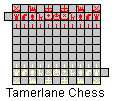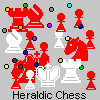 Ed's home page
Ed's home page
Try one of Ed's chess-with-a-difference java applets!
We use different skills depending on whether we are lecturing, leading a group, or teaching one-on-one. As a group leader, you will rely primarily on your clinical interviewing skills. Your warmth, body language, displayed interest, and open-ended questioning will make all the difference.
Small-group sessions force students to take the active role. (By contrast, most lectures should give students a good amount of pre-digested knowledge.) Students learn facts and concepts best when they use them to solve problems. Small groups must be "stimulating", "provocative", and "exciting" -- this guarantees learning. Your job is to present the problems (not give the answers), and to reward good thinking (not just right answers).
When you are leading a small group, you are not going to lecture. Limit any "mini-reviews" to 120 seconds or less.
Arrange the chairs (including your own) in a circle. Don't sit apart from the students. If this is your first time with the group, introduce yourself.
Reward all but the worst contributions from group members. Express agreement with some part of each answer whenever possible. (Student: "I believe that Dr. Friedlander is a Democrat." You: "Well, I think we all would agree that he is a jackass....").
When a student asks a question, encourage other students to answer it before you do. Don't say or imply, "That's a stupid question". If the questioner is not keeping up with the course objectives, the other students "will help the questioner realize this". If you structure a lab so that students ask one another questions directly, the questions will be harder.
Generally avoid calling on individuals. If some students are not participating, invite them to take a more active role. Start with the ones who will return your gaze. For example, you can say, "Joe, would you like to tell us about...." Usually Joe will say something.
To get an especially reluctant student to talk, bring up what the student will be doing in the future. "Joe, you will be spending three months on surgery next year. How will you recognize ischemic bowel at surgery?" Smile and act supportive. Joe will probably give his best answer.
If one student dominates discussion, say, "Thank you for sharing this with us. Let's give the others a chance." If the group is silent, tolerate it. Someone will say something sooner or later.
Feel free to share your thoughts after the students have talked, always distinguishing "hard science" from your personal beliefs and attitudes.
Don't keep them all in their seats for more than 60 minutes. You will lose the attention of the ones that need to go to the bathroom.
Signs of boredom are checking the time, fiddling with pencils, and tapping feet and knuckles. If the group is bored, say: "Where do you think we should go from here?" Do what they say. If most of the group wants to go home, dismiss them.
GROSS ORGAN SESSIONS
Pathologists! Students learn almost nothing by "passing the emphysematous lung around and everybody looking at it." Appearances are better preserved in lantern slides, and textures are altered by fixation. "Gross organ sessions" must be active.
There are many possible approaches. I prefer to have most of the students working on a group activity, and appoint one student as "our expert" on each organ. The "experts" gather around the washed organs, and each tries to identify the assigned specimen by organ and diagnosis.
When they are done, I tell them what they overlooked, emphasizing general principles ("If it looks like a cauliflower, it's probably cancer -- do you remember why?" "Formalin turns blood black." "Why is this old myocardial infarct white and hard?") Whether or not they got the "right answer", I ask them how they arrived at it.
They must now teach their classmates. They will do this with much enthusiasm.
Feel free to develop your own approaches to "gross organ sessions".
Ed's Hints for Good Lectures
Socratic Teaching in the Medical School Classroom
Ed's Guide to Classroom Control
The Effective Pathology Tutor
Preventing "F"'s
| New visitors to www.pathguy.com reset Jan. 30, 2005: |
Try one of Ed's chess-with-a-difference java applets!
 Ed's home page
Ed's home page
 |
 |
 |
 |
 |
 |
 |
 |
 |
 |
 |
 |
 |
 |
 |
 |
 |
 |
 |
 |
 |
 |
 |
 |
 |